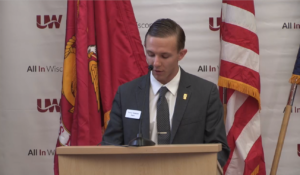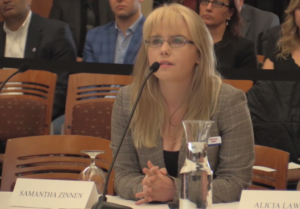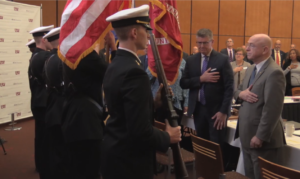MADISON, Wis.—From the prestigious Research I designation earned by UW-Madison and UW-Milwaukee to the purposeful research at the 11 comprehensive universities, the University of Wisconsin System’s research infrastructure is robust and remarkable.
That was the message received by the Board of Regents today in a meeting that included a variety of presentations and discussions focused on shining a spotlight on the scope and significance of the research performed on all UW System campuses.
“We need to help the public – and businesses, communities, legislators, and others – understand the incredible scope, depth and impact of research work that’s done on our campuses every day,” said UW System President Ray Cross. “Today, universities are the primary sources of U.S. research, discovery, and innovation.”
The UW System’s research enterprise is important locally because university research labs employ thousands of people and offer opportunities for undergraduate and graduate students to get experience conducting valuable research. It’s important to the state because of the numerous spin-off companies created thanks to faculty discoveries. It’s important to the world because research discoveries in Wisconsin in the last century have led to life-saving and life-changing moments across the globe – the kind of work that improves the human condition.
The presentations Thursday included:
- The UW-Madison Wisconsin Alzheimer’s Institute’s study known as the Wisconsin Registry for Alzheimer’s Prevention (WRAP), which is one of the largest and longest-running Alzheimer’s disease family history studies in the world, with more than 1,500 participants since 2001.
- “It’s a phenomenal time to be in this field and see the discoveries we’re making,” said Sterling Johnson, Associate Director of the Wisconsin Alzheimer’s Institute, UW School of Medicine and Public Health. “Research at UW-Madison is helping us diagnose Alzheimer’s disease earlier and identify promising prevention strategies.”
- Research on UW-Milwaukee efforts at the Milwaukee Institute for Drug Discovery to develop new drugs that treat pain without opioids, attack brain cancer more effectively, treat cancer with fewer side effects, and control asthma without steroids.
- “Academic researchers are at the heart of drug discovery,” said Dr. Doug Stafford, director of the Milwaukee Institute for Drug Discovery. “No single lab is able to do everything. What we have to do is collaborate, collaborate, collaborate.”
- A partnership between UW-Oshkosh’s Alta Resources Center for Entrepreneurship and Innovation and WiSys to help three students market the Bee Shield™, an invention by a UW-Superior faculty member and a retired engineer colleague to prevent wind from getting into beehives in the winter, thereby reducing bee mortality rates.
- “What started with a research focus turned into life-changing opportunity,” said UW-Oshkosh senior Jessica Tarter, one of three UWO students involved in the project. “We are simultaneously applying what we’re learning in classes to a future career.”
UW Missing in Action Recovery and Identification Project
Regents heard a presentation on the University of Wisconsin Missing in Action Recovery and Identification Project (UW MIA RIP), a multidisciplinary team of researchers, students, veterans, alumni, and volunteers focused on advancing the recovery of missing-in-action service members.
Currently, over 82,000 missing-in-action American service members are unaccounted for as the result of conflicts since the attacks on Pearl Harbor on Dec. 7, 1941. This includes over 1,500 service members from Wisconsin.
Since 2014, the UW Biotechnology Center has helped discover, recover, and/or identify three World War II service members who went missing in the European Theater of Operations.
Introducing the presentation, Regent (and U.S. Marine) Torrey Tiedeman called the project “an example of the Wisconsin Idea in action.”
“Nearly every community in Wisconsin has been touched by the loss of a service member,” said Charles Konsitzke, Associate Director of the UW Biotechnology Center and founder/team leader for the UW MIA RIP.
“The loss to these families is ongoing; the pain did not stop in 1943,” said UW-Madison alumna Samantha Zinnen, a former student volunteer and Historical Research lead on the project. She added that what students gain through such work are “experience, skills, and perspectives that cannot come from a textbook.”
President’s Report
As part of his report, Regent President Andrew S. Petersen provided updates on current searches.
The UW-Stout chancellor search and screen committee, chaired by Regent Jason Plante and Associate Professor Julie Bates-Maves, has now advanced four candidates as finalists. President Cross and the Special Regent Committee will interview the finalists later this month before recommending one candidate to the full Board for approval.
The UW-Green Bay chancellor search, chaired by Regent Bob Atwell and Professor Michael Draney, is currently identifying candidates. It is expected that semi-finalists will be named sometime in early January.
Following President Cross’s recent announcement he intends to retire, Petersen reported that he’d appointed a nine-member search and screen committee last week to help identify the next president. Regent Vice President Michael M. Grebe will chair that committee.
Petersen also provided a brief update on the ongoing All In Wisconsin campaign tour, which has now visited six campuses. “It’s clear that people feel a strong connection to the UW campus in their area, and they’re eager to build that relationship,” he said. The tour’s next stop is Nov. 20, when UW-Stout and UW-Eau Claire will co-host.
Petersen also shared the news that earlier this week, the Wisconsin Legislature voted to confirm the appointment of Regents Edmund Manydeeds, Karen Walsh, and Olivia Woodmansee to serve on the Board.
In other business, the Board:
- Recognized the upcoming Veterans’ Day with a presentation of colors by the University of Wisconsin Naval ROTC Color Guard, commanded by Color Sergeant Midshipman 2nd Class Jacob Friend;
- Approved a contractual agreement between UW-Milwaukee and APT Manufacturing Solutions, which will further the work of UWM’s Connected Systems Institute with Rockwell Automation. Under the contract, APT will construct a Robotics and Materials handling system. Total payments are not expected to exceed $1.3 million;
- Approved a Master Research Agreement between UW-Madison and American Family Insurance. Research by UW-Madison’s Data Sciences Institute will focus on the development of software and web-based solutions to data analysis. research and data analysis. The university will receive an estimated $10 million for deliverables generated from the research projects;
- Approved a Master Service Agreement between UW-Madison and Allergan Sales LLC, focusing on cutting-edge work in age-related macular degeneration. The university will receive in excess of $1 million for this research; and
- Approved a contractual agreement between UW-Madison and Change Healthcare Technologies, LLC successor in interest to McKesson Technologies, Inc. software tools. The Department of Radiology will work to develop software tools to assist radiologists in using medical images to diagnose disease. The agreement is expected to pay over $1 million over its term.
The next meeting of the UW System Board of Regents will be Dec. 5-6, 2019, at UW-Whitewater.



